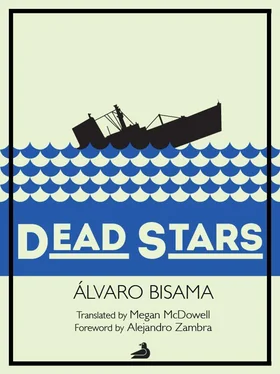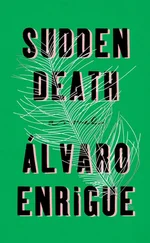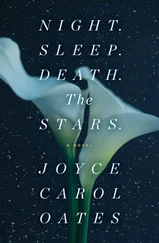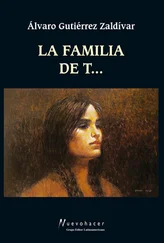I said: Nothing. She looked at the newspaper and held it up for a few seconds in her hands. She tried for the umpteenth time to comprehend that it was true. She closed the newspaper. She said: I think a few things. Thoughts that came to me while I was telling you all this. Thoughts I had without thinking them, like a storyline that can only be resolved this way, in the back of my head, with clues I have to invent for myself, like some sort of lie. Maybe I'm right about everything. Maybe I don't have any of it right. But it's all I know. It's what I believe. I've tried to fill in the empty holes in the article in The Star with what I know, with the little I remember of them. Because two whole lives won't fit into a single conversation.
What do you think happened? I asked. All of this could be a fabrication, she said. What I think: I think Javiera called them in Antofagasta sometimes and no one answered, or someone hung up on her. At some point, she must have found out that Donoso had another girlfriend, that he was rebuilding his life, that he had forgotten her. Remember what that chick told me she saw at the radio station party, that Javiera never stopped talking about Donoso, how they were going to get back together, how they would go back to La Ligua. So Javiera was thinking about that, she was obsessing over it while she paced around the Party headquarters. But something must have set her off. Something motivated her to leave La Ligua and head north. I don't know what it could have been, she said. Maybe Donoso went to live with his new girlfriend. Maybe Javiera found out from someone else. In fact, now that I think about it, that may be the most likely thing. Donoso got together with another girl. That was the logical thing. He started a new life. His life. Maybe he moved on to something else, something we can't even imagine and only Javiera knows, something we can't see in the newspaper photo. The fact is she couldn't stand the distance anymore, she went crazy with jealousy and sorrow. Everyone's felt like that at some point, where you miss someone so badly it seeps into your consciousness and won't let you think straight, until it absorbs you completely. I think that's what happened. Javiera couldn't stand missing Donoso and her daughter anymore. Instead of alleviating the pain, the years only sharpened it. I don't know where she got the money or how she traveled north. I have no way of knowing what bus she was on or how long it took to get there. I don't know if she talked to anyone, if she left a note. The Star doesn't say anything about that. I don't know if her sister found the house empty when she came home, or if Javiera explained in detail what she was going to do, what route she would take. The fact is that she arrived in Antofagasta, a city she'd never been to before. Antofagasta must have surprised her: how old the houses were, the dryness of the air, the imminence of the desert, the aging colors of the city center. I don't know if that affected her. Maybe she listened to a song by Violeta Parra there in Antofagasta, or on the bus. Or two songs. Or three. I want to think she had a whole cassette in her bag, or in her head. There, in those songs, the echo in the room where she recorded them makes Violeta's voice sound more timorous, more broken. Withdrawn into herself, she sings about a woman who leaves pieces of her body around the country, about another woman waiting for a lover who never comes back, about someone watching as a party turns into a funeral. That's how I imagine Javiera, walking around downtown Antofagasta and listening to those songs as if they were her own shadow, like the voice of a consciousness speaking to her from beyond her own, the broken whisper of someone who knows nothing more than how to keep still, in the tense calm of a windowless room. I think that's what Javiera did. I imagine she stayed in a cheap room, or slept in the plaza. I imagine she didn't eat or bathe. It could have taken a little while, or maybe a couple of days, to find Donoso's address. She must have remembered conversations, recalled places, gone back over her own memories while she searched for him. The article doesn't say anything about what Javiera did in Antofagasta, she said. Here's what I think: I think she showed up at Donoso's house. I think he opened the door and didn't know what to say. I think maybe everything was going fine. Donoso hadn't seen Javiera in years. Maybe he thought she looked older. Maybe he didn't recognize her: she didn't look anything like the woman he had left behind. This Javiera in the photograph has white hair, she isn't so thin anymore and she's not wearing glasses. I don't know if things happened like that, if they could have happened like that. Donoso must have invited her in, he must have brought the little girl to her. He must have said: Your mommy came back from her trip. Javiera must have hugged the girl while she lied to her about that long trip that had just ended. The girl must have wondered why she was older than Donoso and why her father had no photos of her mother around the house. It's impossible to know if Donoso talked to the little girl about her, we can't know what he said to her, what the girl knew about Javiera. Maybe that moment was a happy one, maybe it was cheerful. We know, because the newspaper says so, that Javiera stayed there. That Donoso let her stay in his house. He must have called his girlfriend and told her Javiera was there. The newspaper doesn't say anything about that, about whether the girlfriend went to meet her. I bet she did. I bet she went to see Javiera, to meet her. I would go: I'd want to know who hurt you, whose hands you'd passed through before you were with me, she said. Maybe they met. Maybe they spoke. Maybe Donoso's girlfriend left and Javiera stayed. Maybe that's what set everything off, maybe that's the missing piece. That night, maybe she argued with Donoso. Maybe they slept together. Maybe she rejected him or he rejected her. Maybe she stayed up all night. Maybe no one in that house could sleep, she said. Maybe all three of them, Javiera, Donoso, and the little girl, were in their rooms, trapped, thinking about the roles they played in all that drama. The next morning, Javiera asked Donoso if she could stay and watch the girl. Donoso agreed. Javiera said goodbye from the doorway of a house that wasn't hers, from the threshold of a life she would never have, she said. I can imagine that goodbye. The clear sky, the metallic blue of Antofagasta. The desert whispering in her head like the devil. The morning sun ricocheting off the bare horizon of the hills. I want to imagine that. I want to think of it as one last second of peace, like some impossible and final form of sanity, she said.
But things didn't happen that way. That's not what's in the article, I said. That's why the police are taking Javiera away, I said. I said: That morning, yesterday morning, Javiera drowned the child in the bathtub.
That's how it all ends. I picked up The Star and looked for the umpteenth time at Javiera's face in the photograph, at Javiera in handcuffs. Then I dropped the paper and tried to cross the chasm of that table that separated us. I took her hand. She pulled away. It was over. Her face had changed. My face had changed. I looked at our reflections in the bar mirror. There was nothing there now. That's all they were, reflections. Outside, the ashes went on falling. The fire wouldn't stop. I ran my eyes over the sequence of the shipwreck on the wall. I tried to look at the photos in reverse, like before, to pretend that the order of the images was inverted, that something was emerging from the depths of the paper ocean. She was looking at the same photos, but in the opposite direction. Then she stood up and walked out. The newspaper was lying there on the table. The waiter came and left the check. I paid and went out. I walked half a block and sat on a bench in Parque Italia and I stayed there for an hour, breathing in the dirty air, looking at the black clouds and the far-off reflection of the fires devouring the earth beyond the hills.
Читать дальше





![Джеймс Чейз - Safer Dead [= Dead Ringer]](/books/430347/dzhejms-chejz-safer-dead-dead-ringer-thumb.webp)






